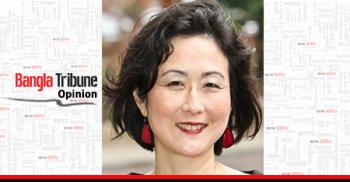 Every fall, when the leaves begin turning yellow and brown, I think of my late grandmother. Born in 1913 in what is now South Korea, she spent some of her early life in what is today North Korea. In both parts of the then-undivided peninsula, my grandmother lived according to the rhythm of the changing seasons; in her later years, she loved recalling the harvests of her youth, when Korea’s fields were bursting with life-sustaining golden grain. For me, her granddaughter, fall remains a time to assess what I have harvested in my life, and to examine the fruits the world has borne – or failed to bear. This year I’ve concluded that, while North Korea has reaped a bumper crop of political gains since last fall, the United States has come up empty.
Every fall, when the leaves begin turning yellow and brown, I think of my late grandmother. Born in 1913 in what is now South Korea, she spent some of her early life in what is today North Korea. In both parts of the then-undivided peninsula, my grandmother lived according to the rhythm of the changing seasons; in her later years, she loved recalling the harvests of her youth, when Korea’s fields were bursting with life-sustaining golden grain. For me, her granddaughter, fall remains a time to assess what I have harvested in my life, and to examine the fruits the world has borne – or failed to bear. This year I’ve concluded that, while North Korea has reaped a bumper crop of political gains since last fall, the United States has come up empty.
Last week, in a bid to shift that imbalance, South Korean president Moon Jae-in visited Pyongyang for a third meeting with North Korea’s Kim Jong Un. The latest Kim-Moon summit was billed as a litmus test for a second US-DPRK (Democratic People’s Republic of Korea) summit proposed by the North Korean leader. According to Victor Cha, a former US diplomat who negotiated with Pyongyang more than a decade ago, the North Koreans "are getting everything they want right now.” This includes successfully testing intercontinental ballistic missiles late last year, starring in February’s Pyeongchang Winter Olympics, a diplomatic reconciliation with Beijing, and a historic coming-out party in April when Kim met Moon for the first time at Panmunjom. But Kim’s crowning achievement was his June summit with US President Donald Trump in Singapore, where he “normalized” his status as the world’s supreme dictator.
Since then, the easing of Chinese sanctions has given the North Korean economy a massive infusion of fuel and other vital goods, and strengthened a dynamic trade in coal, fishing rights, and Chinese tourists – all without giving up nuclear weapons. On the contrary, Pyongyang appears to have been tending its nuclear crops even more assiduously, increasing uranium enrichment and fuel for nuclear plants, while building structures to hide its existing weapons arsenal and to thwart foreign surveillance efforts.
What has Washington harvested from its strategy of “maximum pressure” (punishing sanctions and enforcement) and from the Singapore summit, after which Trump declared that North Korea was no longer a nuclear threat?
Trump appeared to accept the weakening of Chinese sanctions during his first news conference following the June meeting in Singapore. While painting a rosy picture of his talks with Kim and promising great things to come in the bilateral relationship, Trump noted that China had lapsed in recent months on enforcing sanctions against Pyongyang, “but that’s OK.” This became a blinking yellow light allowing not only China but other countries, including Russia, to bypass sanctions.
Although Nikki Haley, the US Ambassador to the United Nations, recently lambasted Moscow for allegedly violating the UN sanctions regime and then pushing for the alteration of a UN report in order to cover up the violations, her tirade – even if justifiable on the grounds of UN Security Council principles – was misplaced, and sent a confusing political message. If sanctions violations and continuing support for the North Korean regime were the real reason for Haley’s outrage, then China – not Russia – should have been the primary target. This kind of diversion underscores Washington’s lack of progress with North Korea, reinforcing the view that Washington is unfocused and unreliable and that Seoul must take the lead. Moon Jae-in has stepped in to mediate between Pyongyang and Washington, but in practice is serving as the “adult” in the room.
Seoul’s dogged pursuit of a peace treaty with Pyongyang may seem abstract and idealistic, but the Pyongyang summit earlier this month yielded substantive and concrete steps toward rapprochement: regular military communication and cooperation to prevent clashes in the West Sea, new “buffer zones” on land and sea, halting military exercises in the Demilitarized Zone (DMZ), and launching joint search operations to locate the remains of Korean War casualties in the DMZ. Such measures are intended to increase South Korea’s security and decrease its dependence on Washington.
Despite the Trump administration’s insistence that the international community honour UN sanctions, South Korea has begun seeking economic engagement with the North. South Korean firms are positioning themselves to enter various areas of the DPRK market, including construction, manufacturing, infrastructure development, communications, and financial operations. Warmer inter-Korean relations have encouraged other Asian countries to follow suit and to welcome Moon’s New Southern Policy, which focuses on advancing economic and other ties with Southeast Asia and India.
American Secretary of State Mike Pompeo’s August visit to Southeast Asia, on the other hand, failed to boost regional support for sanctions against North Korea. Malaysia’s Prime Minister Mahathir Mohamad had already declared, in June, that his government would reestablish full diplomatic relations with Pyongyang, even resuming the visa waiver agreement that had been dropped in response to the DPRK’s 2017 assassination of Kim Jong-un’s half-brother Kim Jong-nam in a Malaysian airport. Mahathir characterized the event, rather dismissively, as a “simple case of murder,” and appears eager to burnish his reputation as a champion of sovereignty among developing countries; his eagerness to befriend Pyongyang may also stem from a desire for first-mover advantage in a country he believes is on the brink of opening up. Indonesia also seeks a piece of the action on the peninsula; in recent months, Jakarta has elevated its relationship with Pyongyang through high-level diplomatic visits, and honoured Kim with an award for “global statesmanship.”
Even Japanese Prime Minister Shinzo Abe, Trump’s most loyal friend in East Asia, has been sowing the seeds of diplomacy with Pyongyang through direct talks with Kim – despite Washington threatening Japan with more tariffs and Japanese officials acknowledging that the United States can’t be relied on to negotiate the return of Japanese abductees. Now that Abe has won a historic third term, he is likely to push hard to join the posse of national leaders who have talked with Kim. Abe’s campaign promises included negotiating with Pyongyang and, in August, Japanese officials met their North Korean counterparts without prior consultation with Washington.
A series of contradictory statements from the Trump administration – and increasing evidence of personnel issues and policy shifts within it – have corroded American power and influence in Asia. Even the multilateral naval cooperation that the United States helped forge, and which is led by the UK and France, to police DPRK ship-to-ship exchanges that violate United Nations sanctions invites the British and French to increase their interests as “legitimate Indo-Pacific powers,” while American leadership recedes.
At the United Nations General Assembly this week, Trump praised Kim for his courage. Such flattery is no doubt calculated to entice Kim to denuclearize. Nevertheless, it’s a radical turnaround for Trump, who last year excoriated Kim for his human rights violations and "depraved regime," and it tops off a bountiful year’s harvest for former “Rocket Man” Kim Jong Un.
Katharine HS Moon is a political science professor at Wellesley College and a non-resident senior fellow at the Brookings Institution.


